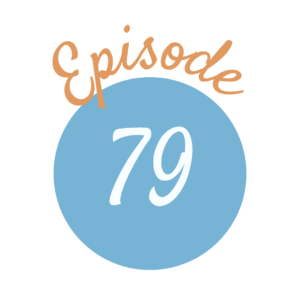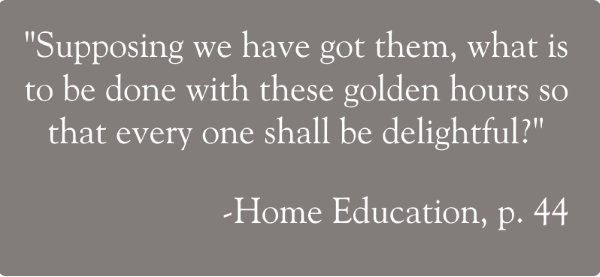
Listen Now:
“Supposing we have got them, what is to be done with these golden hours, so that every one shall be delightful? They must be spent with some method, or the mother will be taxed and the children bored.” (Vol. 1, p. 44)
“In this time of extraordinary pressure, educational and social, perhaps a mother’s first duty to her children is to secure for them a quiet growing time, a full six years of passive receptive life, the waking part of it for the most part out in the fresh air.” (Vol. 1, p. 43)
“‘Except ye become as little children ye shall in no case enter the kingdom of heaven.’ ‘Who is the greatest in the kingdom of heaven?’ ‘And He called a little child, and set him in the midst.’ Here is the Divine estimate of the child’s estate. It is worth while for parents to ponder every utterance in the Gospels about these children, divesting themselves of the notion that these sayings belong, in the first place, to the grown up people who have become as little children.” (Vol. 1, p. 12)
“So education does not start without much to go upon; the child is a person, a whole person, with all the powers latent that he will ever have. Therefore, education must advance altogether if it advance at all. One-sided development will leave other sides maimed. ‘Wisdom is justified of all her children,’ and varied knowledge in many directions is as necessary for the growth of the mind as varied food for the body.” (Kitching, Children Up to School Age and Beyond, p. 9)
“The consideration of out-of-door life, in developing a method of education, comes second in order; because my object is to show that the chief function of the child––his business in the world during the first six or seven years of his life––is to find out all he can, about whatever comes under his notice, by means of his five senses; that he has an insatiable appetite for knowledge got in this way; and that, therefore, the endeavour of his parents should be to put him in the way of making acquaintance freely with Nature and natural objects; that, in fact, the intellectual education of the young child should lie in the free exercise of perceptive power, because the first stages of mental effort are marked by the extreme activity of this power; and the wisdom of the educator is to follow the lead of Nature in the evolution of the complete human being.” (Vol. 1, pp. 96-97)
“The flowers, it is true, are not new; but the children are; and it is the fault of their elders if every new flower they come upon is not to them a Picciola, a mystery of beauty to be watched from day to day with unspeakable awe and delight.” (Vol. 1, p. 53)
“There is one thing the mother will allow herself to do as interpreter between Nature and the child, but that not oftener than once a week or once a month, and with look and gesture of delight rather than with flow of improving words––she will point out to the child some touch of especial loveliness in colouring or grouping in the landscape or the heavens. One other thing she will do, but very rarely, and with tender filial reverence (most likely she will say her prayers, and speak out of her prayer, for to touch on this ground with hard words is to wound the soul of the child): she will point to some lovely flower or gracious tree, not only as a beautiful, but a beautiful thought of God, in which we may believe He finds continual pleasure, and which He is pleased to see his human children rejoice in.” (Vol. 1, pp. 79-80)
“We have now started on the noblest work that can engage the mind of man, the guiding of the growth of our own child. Notice I say, the guiding of the growth, not the systematic training of a child in the ways that were good enough for his father and ought to be good enough for him.” (Roscoe, The PNEU in the Home, p. 2)
“Guard the nursery; let nothing in that has not the true literary flavour; let the children grow up on a few books read over and over, and let them have none, the reading of which does not cost an appreciable mental effort.” (Vol. 5, p. 215)
“They must grow up upon the best. There must never be a period in their lives when they are allowed to read or listen to twaddle or reading-made-easy. There is never a time when they are unequal to worthy thoughts, well put; inspiring tales, well told.” (Vol. 2, p. 263)
“The children should have the joy of living in far-lands, in other persons, in other times–a delightful double existence; and this joy they will find, for the most part, in their story-books.” (Vol. 1, p. 153)
[If there is nothing better to think about,] “the children who are persons endowed with minds, clamour to be taught to read and write. We can do it with our children if we like, but it must be at the like cost, the exclusion of the intellectual and imaginative interests and joys proper to children, the devotion of dreary hours every day to these dead pursuits. No, let us be content to be the handmaids of Nature for the first five or six years, remembering that enormous as are the tasks she sets the children, she guides them into the performance of each so that it is done with unfailing delight; for gaiety, delight, mirth belong to her method. If a child chooses to read and write before he is six, let him, but do not make him; and when he does begin, there is no occasion to hurry; let him have a couple of years for the task.” (Mason, Three Educational Idylls, 811)
If you would like to study along with us, here are some passages from The Home Education Series and other Parent’s Review articles that would be helpful for this episode’s topic. You may also read the series online here, or get the free Kindle version from Fisher Academy.
Home Education (Volume 1), Part II, Chapter I; Part V, Chapters 1-3
Sabbath Mood Homeschool’s Outline for Out-of-Door Life for Children
PNEU Pamphlet: Children Up to School Age and Beyond, Elsie Kitching
PNEU Pamphlet: The PNEU in the Home, Mrs. Roscoe
Three Educational Idylls, Charlotte Mason
Excellent blog post, relevant for these early years by a former head of a CM School





Thank you very much for this episode! I was wondering if you might please list some of your favorite books, nursery rhymes, and other resources for the early years. Thank you!
Dear Erika,
Some books that might help you identify new titles are listed on http://www.livingbookslibrary.com “Books about Books.” Look for classic picture books with beautiful illustrations from authors before 1970, and read simple chapter books like Charlotte’s Web and Heidi and Little House.
Liz
Hi, I’m curious. I’m in Arizona where we aren’t required by law to formally teach until the age of 8. Would I be able to postpone formal lessons till the age of 8 while continuing in the areas you all have mentioned in this episode, following the Charlotte Mason method or would that conflict with her method for the ages of 6-8?
Kayla,
Though we obey the laws of the land, I’m sure you understand that as parents we do not wait for the state to decide for us what is best for our children. Formal lessons should begin at six. Form I is for ages six to nine, the first three years of school in which the child becomes accustomed to formal learning and important foundations are laid for future study: reading, writing, arithmetic, narration. Please read Home Education by Charlotte Mason where she outlines parents’ obligations, the fundamentals of education, and Christ’s commandments regarding children. Note our Subjects by Form chart on the website, and listen to our episodes on form Ib and Ia.
-Liz
Hi! I was wondering if you had any further detail/explanation about the large, clay work and raffia handicrafts that were mentioned?
Thank you!
I would also like more information, especially about the raffia work.
I really pushed my the oldest kids to learn reading and math, it’s kind of the social norm right now. Then I changed my mind and I decided I would not push my younger kids. However, my little girl feel in love with the idea of joining school and wanted so much to learn reading, writing, and math. Would you discourage that or allow it without a formal setting? I mean how do you say, ” No dear, you cannot do math, you’re not old enough.” Without giving a negative message about being young?
Never mind, I had the chance to listen to the end and you answered my question. Thank you! These podcasts are so inspiring!
Pingback: 29 Charlotte Mason Inspired Preschool Books -
Pingback: A Charlotte Mason Inspired Preschool Daily Rhythm – THE SILVAN REVERIE